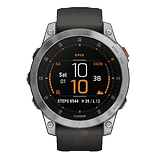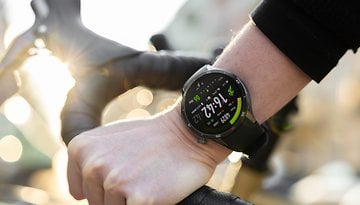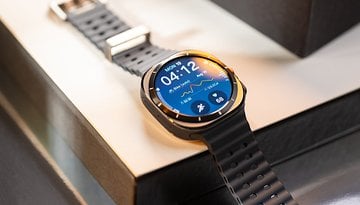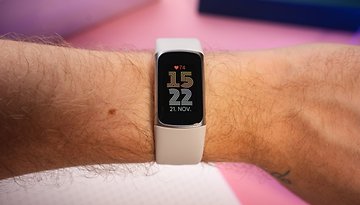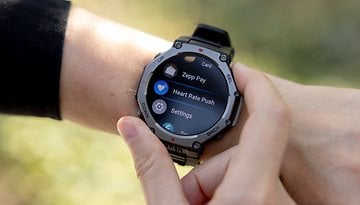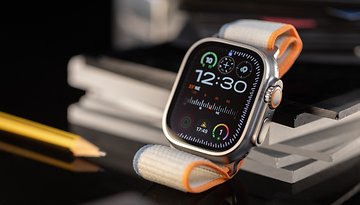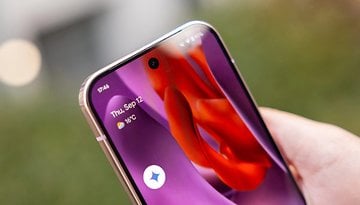Garmin Epix 2 review: This is the watch sports fans have been waiting for!
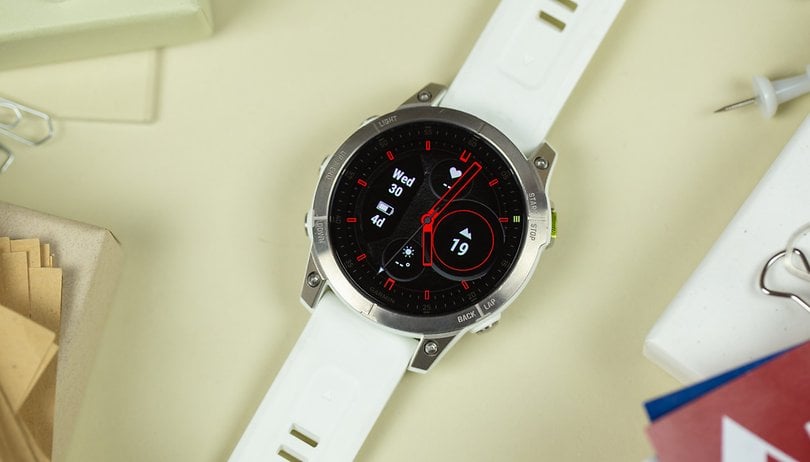

The Garmin Epix 2 promises to be the smartwatch Fenix fans have been waiting for years: a Fenix 7 armed with a chic AMOLED display. However, the display also comes with a compromise. We tested the new Garmin Epix 2 for you.
Good
- Huge accessory ecosystem
- Great tracking features
- Great running analysis functions
- Robust workmanship with optional sapphire crystal
Bad
- Missing smartwatch features
- Only one size available
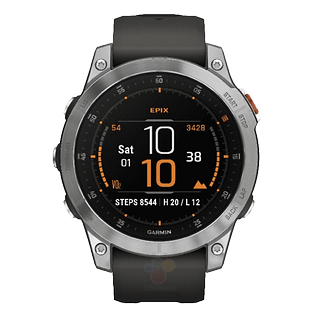
The Garmin Epix 2 in a nutshell
Do you attach more importance to the fitness features of a smartwatch than to the smart functions? If so, the Garmin Epix 2 is the ultimate sports watch for you, provided that so many of the tracking features are worth at least $899.99 (MSRP).
However, there is simply no smartwatch on the planet that offers that many diverse sports features while telling the time. Nevertheless, there is still room for improvement in terms of smartwatch features, which means we can most probably look forward to the Garmin Epix 3!
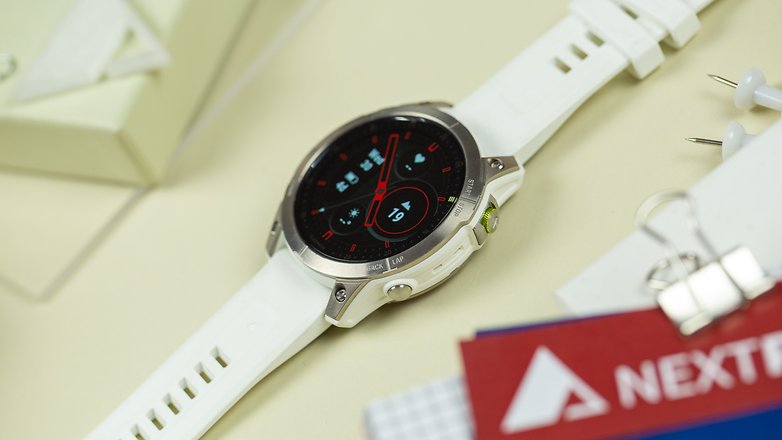
In the basic version with 16 GB of storage, Gorilla Glass CX and stainless steel, the Epix 2 costs $899.99. The mid-range Epix, which costs $999, offers double the storage space, sapphire glass, and titanium. The upgrade to "real" titanium will then cost you another $100 on top of that.
- Looking for an alternative? The best smartwatches at NextPit
Design & Display
The Garmin Epix 2 comes in the typical bulky Fenix design, but offers the chic AMOLED display that Garmin also uses in the Venu 2 Plus. I am quite sure that Garmin fans have been waiting for this combination for a long time.
What I liked:
- High-resolution AMOLED display.
- Robust, chic design.
What I disliked:
- No smaller S version available.
"I'm a sports watch," the Garmin Epix 2 screams with every fiber of its being. The case, which measures just under 1.5 centimeters thin and 4.7 centimeters long and wide, makes a statement even on wide wrists. The robust design with the (depending on the color variant) more or less color-contrasting bezel and open screws underline the robust features from the specifications sheet.
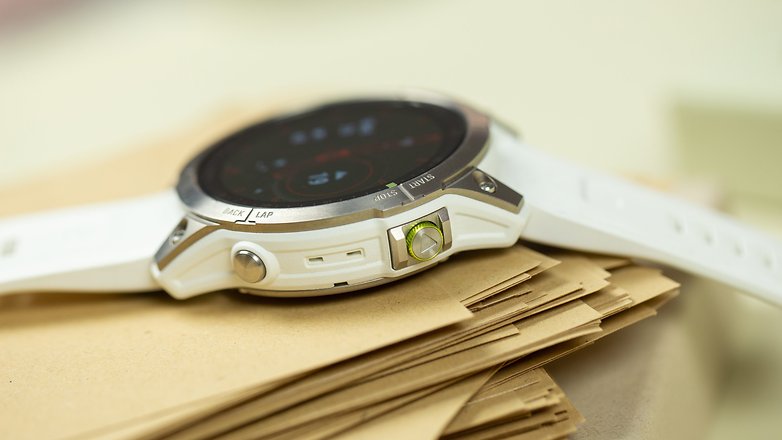
In the standard variant, the bezel is made of stainless steel, with the case being made of polymer and steel, while the display coating uses Gorilla Glass DX. The Sapphire version, on the other hand, relies on, surprise, surprise, sapphire glass for the display and replaces the steel components with titanium ones. As a result, the Sapphire version is not only more robust, but also six grams lighter than the standard version at 70 grams. Both versions are water resistant to a depth of 100 meters and rely on 22-millimeter standard straps.
There are a total of five buttons with excellent pressure points on the right and left of the case. In its 2022 flagships, Garmin has lightly protected all buttons, which effectively protects against accidental activation in the review. In addition to the five buttons, the Epix 2 offers a touch-sensitive display, which is also the biggest differentiator from the Fenix 7.
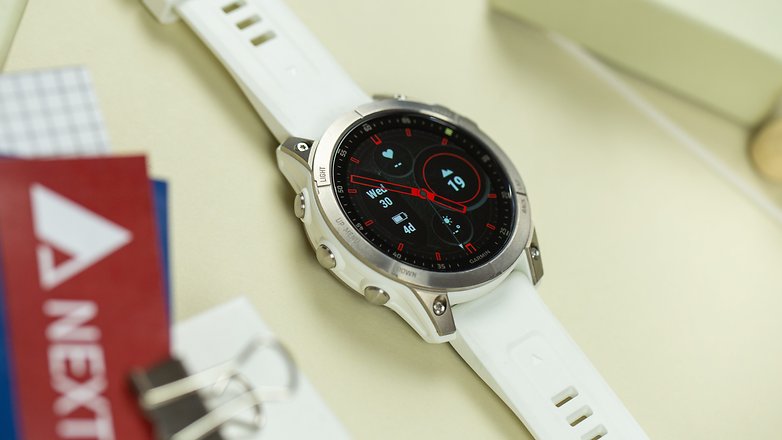
The AMOLED panel of the Epix 2 is an old friend of whom we are familiar with: We already know of the 1.3-inch display from the Garmin Venu 2 Plus. With 65,000 colors (Fenix 7: 16 colors) and 416 x 416 pixels (Fenix 7: 260 x 260 pixels), the screen is really fun to look at. I used the Epix 2 in always-on mode in the review: The default settings will have the display turned on at all times during the day. By tapping the display, pressing a button or raising the arm, the Epix 2 increases the brightness and displays the second hand.
- Also read: Garmin Venu 2 Plus review
The display is almost always perfectly legible in the "normal" always-on mode. Only when you are in bright sunlight and looking from the side did I have to press a button to increase the brightness and tell the time. The transflective MIP display of the Fenix 7 carries a slight advantage in this aspect.
Operation and smart features
The Garmin Epix 2 is first and foremost a sports watch before it is a smartwatch. Sure, we will miss out on a few features, especially when making a direct comparison with the current watches from Apple, Samsung, and others. On the other hand, the features it has are simply unbeatable in the sports sector.
What I liked:
- Operation also possible using the buttons alone.
- Incredibly flexible user interface.
What I disliked:
- Garmin Pay supports only a few banks.
- Smartwatch functions can be miserly.
- No LTE version available.
As previously mentioned, the Epix 2 has five buttons. On the right side, there is a "Start/Stop/Ok" button at the top and a "Back/New Lap" button at the bottom. Garmin has placed two buttons for "Menu/Up" and "Down" in the center and at the bottom on the left, and the button on the top right is used to activate the backlight and calls up the quick settings with a long press. Shortcuts for a long press can be defined for all buttons.
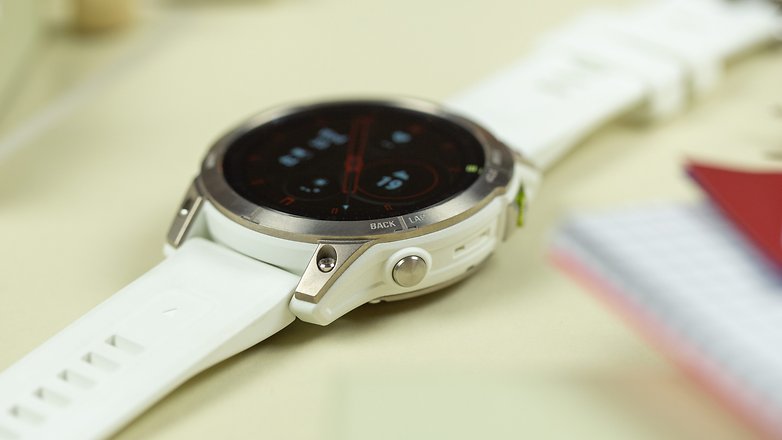
The Garmin Epix 2 can be operated completely using the buttons alone. This is very practical, for example, when you wear gloves or move in water. In many situations, however, using the touchscreen is more practical such as when one is navigating a map. With the factory settings, the Epix 2 deactivates the touchscreen during workouts to avoid unwanted input. However, it is much faster to enter the weight and configure the set repetition via the touchscreen during weight training.
Basically, the Epix 2 is incredibly flexible to configure, and fortunately, most settings can now also be made on the smartphone via the Garmin Connect app. It is a pity is that you cannot yet migrate settings from an old Garmin watch to a new one.
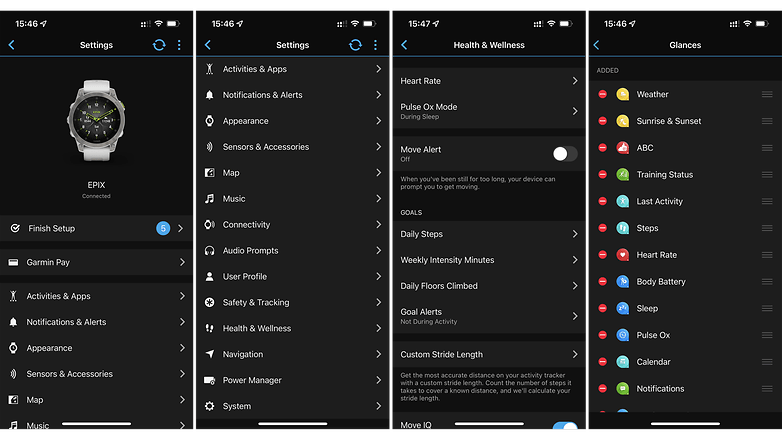
Whether it is through a finger swipe or touchscreen: From the watch face, be it up or down, you navigate through a series of widgets whose selection and arrangement is also configurable. These widgets will show you the weather forecast, sunrise and sunset times, compass, activity level, past workouts, pulse or your daily shape as a "Body Battery" index, for instance.
Garmin also offers widgets for calendar entries and notifications, but they are not as powerful as what we are used to from current smartwatches. The notifications, for example, display generic message icons for many apps and can thus be rather difficult to distinguish. Although notification texts can be read, even simple replies are currently not possible.
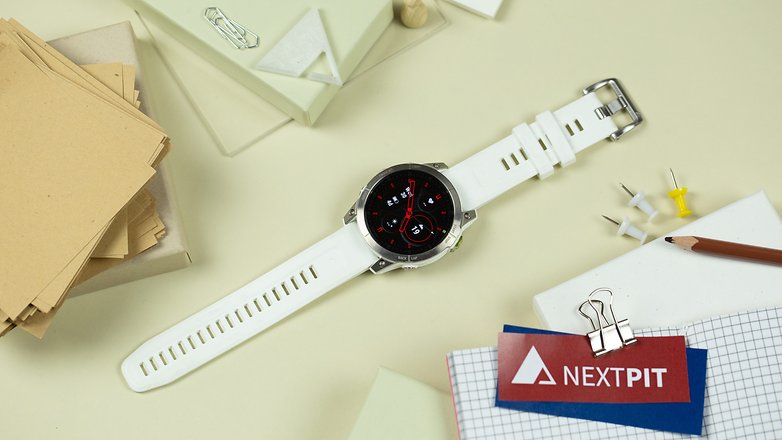
Unlike the Venu 2 Plus, the Garmin Epix 2 also offers neither a microphone nor speakers. As such, it does not allow for wrist-based phone calls, nor does it support voice assistants. Unlike the Forerunner 945, there is also no LTE option for the Epix 2. At least there is NFC on board, so you can pay via Garmin Pay. However, none of my three banks are supported.
On the plus side, there is the Garmin Connect IQ Store with numerous apps and watchfaces available. You can browse through the catalog either on the watch or more conveniently, on the smartphone. Usual suspects like Komoot, AccuWeather or Spotify are found here. Thanks to Bluetooth, you can listen to music or podcasts on the go.
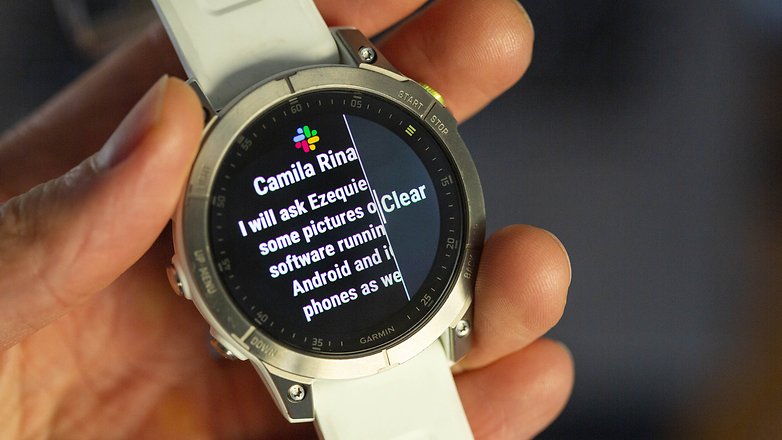
Tracking & Sensors
Garmin has more tracking and sports features than you could ever use. With one activity per day, you'd be busy for a good two months to work through the entire repertoire at least once. And "cross-country skiing" isn't just a knock-off of "alpine skiing" - you can find cross-country trails or slope maps including ski huts on the Epix 2's maps. Do you prefer running shoes or pedals instead of boards? Then Garmin also offers incredibly detailed options.
What I liked:
- No other manufacturer offers more sports features.
- Precise GPS tracking and accurate maps.
- Very diverse accessories.
What I disliked:
- Feature set can be overwhelming at first.
- No native option for nutrition tracking.
Like the Fenix 7 models, the Epix 2 brings a number of new workout features over the 2021 generation. Watersports fans can look forward to kiteboarding and windsurfing options, in addition to new maps for alpine skiing, cross-country skiing and golf. Even Garmin's formerly paid TopoActive maps are now free on the Epix 2.
Outdoor Sports & GPS
Like the Fenix models, the Epix 2 offers just about everything outdoor sports enthusiasts could want. Our Epix 2 review unit offers multi-band GPS as a sapphire glass option, although I cannot see any significant improvement over the Venu 2 Plus here in everyday use and in my run through the forest. The positioning is almost instantaneous, there are no problems with shortcuts, and the watch tracks trails that have been run multiple times practically congruently.
There are also a number of interesting GPS features: For example, you can save specific coordinates or record routes, or navigate through recorded routes or routes from third-party sources like Komoot after starting any GPS sport as a workout.
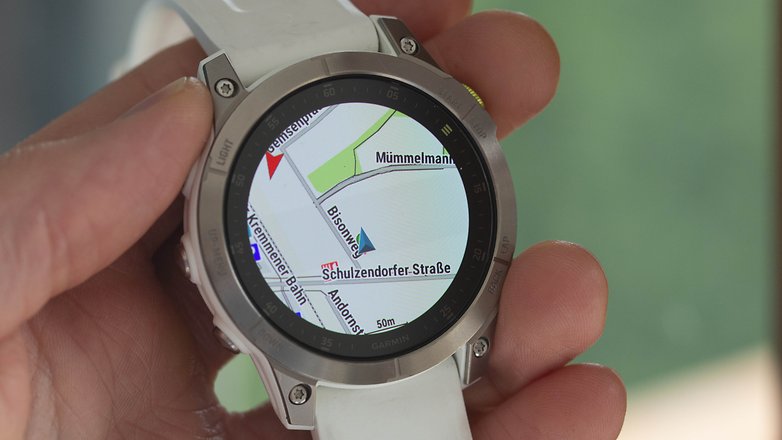
The extensive accessory set is especially exciting for outdoor athletes: For cyclists, there are cadence sensors that measure the cadence on the bike. For triathletes or runners, Garmin offers various heart rate belts. These are then, for example, waterproof or offer advanced running analysis functions and record, for example, the vertical movement and ground contact time during running, so that you can optimize your running style.
Garmin HRM Dual heart rate belt
During your workouts, Garmin shows you detailed information such as heart rate zones, current pace, etc. You can now also customize the way data is viewed on your smartphone. I find the Stamina display to be particularly exciting. Here, the Epix 2 tries to estimate how many kilometers you can still run or how much time you have left at the current pace. The idea behind this? You can estimate during your runs on distance or time whether you will run out of energy before the finish line at the current speed, or still have additional energy to spare at the end.
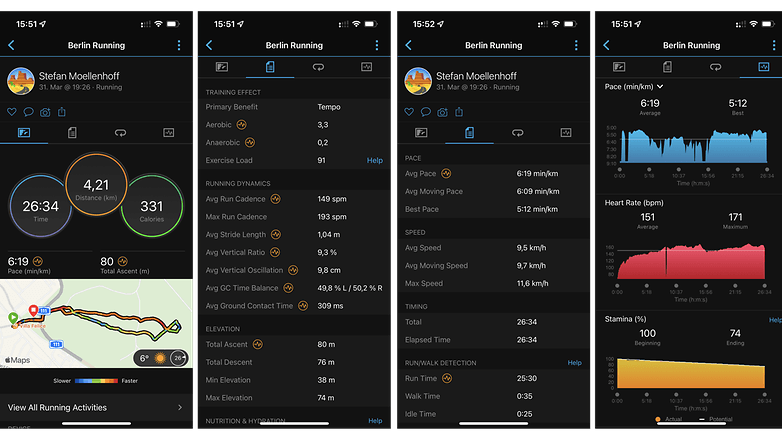
Of course, like all data from fitness trackers and the like, these are only estimates that should not be trusted blindly. But with a little experience, such values can definitely be helpful. Finally, Garmin offers comprehensive training plans with different goals for running fans, which follow the training philosophies of various running gurus. The plans are really well prepared.
Indoor sports & fitness
Even though outdoor sports are the great heritage of Garmin's sports watches, the Epix 2 also offers numerous features for indoor fitness applications. During HIIT or strength training, for example, the smartwatch not only tracks your heart rate, but also the exercises you perform, including the number of repetitions. You can then obtain an evaluation on which muscle groups were used and to what extent.
Garmin also offers predefined workouts such as HIIT training, and you can create your own workouts via the app. For the future, I would still like to see a load status including recovery time not only for the entire body, but also for individual muscle groups. This would make it possible to better estimate the training intensity for the next strength training session.
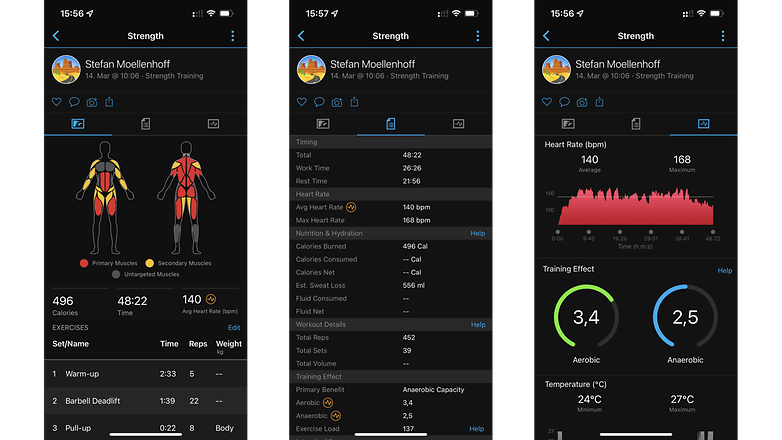
Whether for outdoor or indoor sports: the Elevate Gen4 heart rate sensor from Garmin offers a very decent heart rate measurement and hopefully also in the long term thanks to the new glass coating. For sports with little strain on the wrists, the results are very precise and largely congruent with the results from a chest strap system.
For sports that involve the wrists, having a tight fit of the watch on the wrist is important. But even then, the readings somewhat diverge compared to those of a chest strap system, especially when one has a high heart rate. During a shoulder-arm workout, for example, the Garmin Epix 2 came up with a maximum pulse of 150 and an average pulse of 115. With a Sigma chest strap, the average pulse of 117 was only slightly higher, but the maximum pulse measured here deviated significantly to 165.
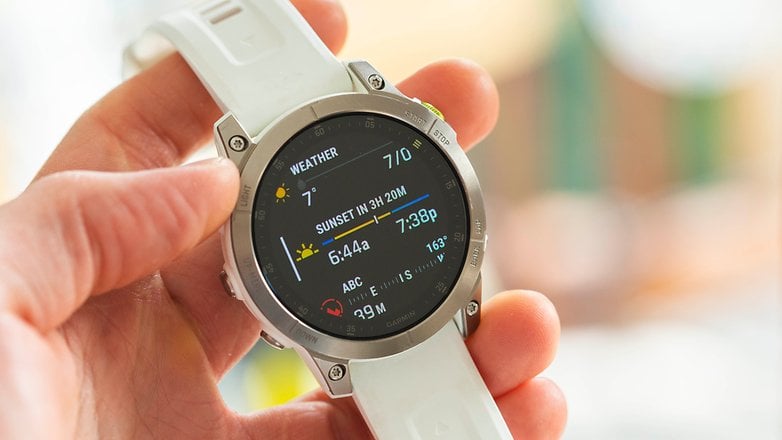
Sleep & Recovery
Last but not least, the Epix 2 offers a lot of features to evaluate your general fitness. The most prominent feature is the Body Battery, which is your body's 'battery' or energy levels. Workouts and stressful days drain the battery, and sleep fills it up again. Garmin wants to give you a measure of how hard you can work out.
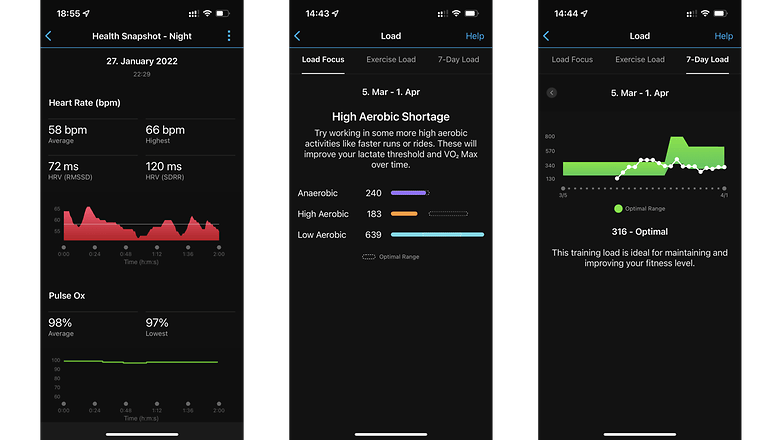
Another feature to evaluate your fitness is "Health Snapshot". Here, you get a daily update of your fitness in a two-minute measurement based on pulse, heart rate variability, oxygen saturation (SpO2), respiration rate and stress. If you want to compare the values with each other, you should always perform this "screenshot of your health" at the same time of day. In addition, the Epix 2 will also determine your VO2Max value.
The training load over time is also interesting. Here you can see what kind of training stimuli you are using to stimulate your body: Anaerobic, High Aerobic and Low Aerobic? The bottom line is that I found out: I should do less strength training and more endurance training.
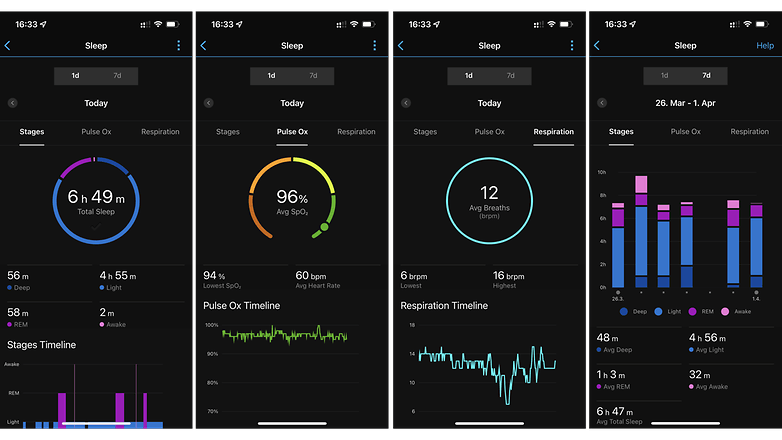
Last but not least, the Garmin Epix 2 records your sleep. This works reliably in terms of your sleeping and waking times. Unfortunately, I cannot check the determined distribution of the different sleep phases due to the lack of a sleep lab. However, I can confirm a correlation between puffy eyes in the morning and poor sleep assessment by the Epix 2, such as retiring for the night way too late after a sumptuous dinner.
Garmin Epix 2 battery
In contrast to its sister model Fenix 7, the Epix 2 offers significantly less battery life, although "significantly less" is still a lot. With an always-on display, active sensor battery and one hour of exercise per day, the sports smartwatch still manages almost a week of activity before requiring a trip to the power outlet.
What I liked:
- Great battery life.
What I disliked:
- No wireless charging supported.
The AMOLED display of the Epix 2 does take up a significant chunk of the battery life. While the Fenix 7 (without solar) lasts 18 days in smartwatch mode according to the manufacturer, it is "only" six days for the Epix 2 according to Garmin. In the review, we normally achieved five to six days of battery runtime on five out of seven days with fully activated sensors, always-on display and activity tracking. That is excellent value compared to most of the other smartwatches out there.
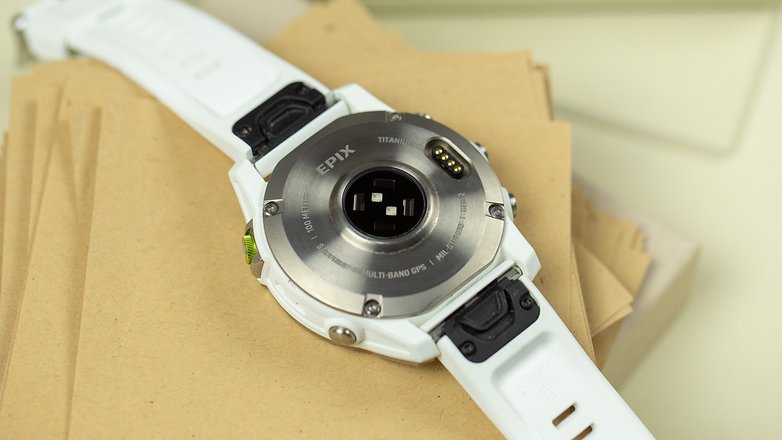
Unfortunately, we were not able to test the various power-saving features in detail during the review period. Garmin promises 16 days of battery life with the always-on display deactivated, and even 21 days in power-saving mode. In maximum operation during a workout with GPS tracking, multi-band GPS and music playback, the Epix 2 is supposed to last 9 hours, which is probably enough for most ultramarathoners out there.
When it comes to charging, Garmin relies on its well-known proprietary four-pin charging cable, which has also been used by the Venu, Forerunner, or Fenix models for years. Unfortunately, Garmin still does not support wireless charging in 2022. In view of the long battery runtimes, this missing feature is more acceptable than not having it on an Apple Watch.
Final verdict
Garmin fans have been waiting for a watch like the Epix 2 for years: a Fenix with a chic display. Underneath the hood, the Epix 2 has the same enormously versatile and sophisticated hardware as the new Fenix 7 and is thus already probably the best sports smartwatch of the year. It is just a pity that there is no "smaller" Epix like the Fenix 7S. Probably the biggest weakness would be its smartwatch features, or rather, the lack of it. The notifications, for example, are very basic, there are too few partners to work with Garmin Pay, missing LTE connectivity, and missing microphone and speakers.
Accessories for the Garmin Epix 2:
Garmin HRM Dual heart rate belt
